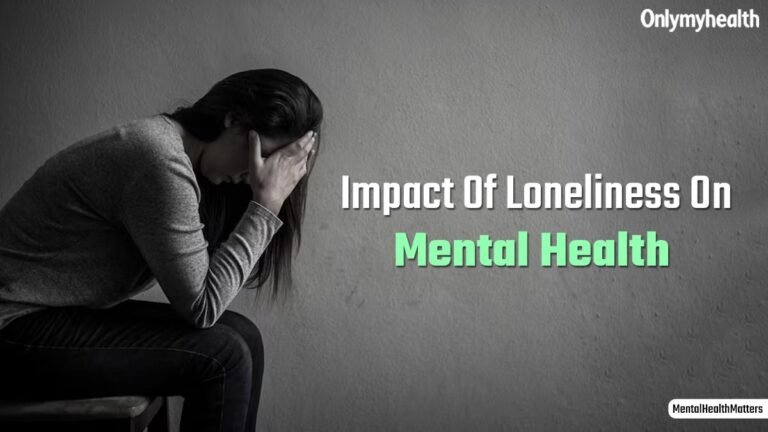Feelings of loneliness not only affect your emotions, but also have a huge impact on your mental health. Keep reading to find out how.
In today’s world, people have access to numerous social media platforms and digital communication methods. However, despite all these resources, many people still feel lonely and isolated. This feeling of loneliness not only affects your emotions, but it also has a huge impact on your mental health. It can change our mood and cognitive function and damage our overall health.This week, our “Mental health is important” series, we talked Pritika Singh, CEO, Prayag Hospital Group, Noida; Who explained the impact of loneliness on mental health.
The impact of loneliness on mental health
“Loneliness is more than just a lack of company. It’s a deep sense of disconnection from others, a feeling of being misunderstood and unloved, even in a crowded room. Its impact on mental health. is widespread and serious,” Singh said.
According to HHS Public Access, 80% of people under the age of 18 and 40% of adults over the age of 65 report feeling lonely at least sometimes. The prevalence of loneliness decreases in midlife and then increases with age.
neurological response
Dr. Singh explains, “When meaningful social connections are lacking, the brain responds by increasing stress levels, causing the release of cortisol, the body’s main stress hormone.” Over time, this chronic Stress can wreak havoc on both our physical and mental health, leading to health problems ranging from heart disease to cognitive decline. ”
Also read: Mental health matters: Experts explain maternal gatekeeping and reducing feelings of isolation
cognitive dysfunction
Loneliness doesn’t just affect our mental well-being. Cognitive function is also impaired. Lonely people often have deficits in attention, memory, and decision-making abilities. “The constant rumination and negative self-talk that come with loneliness can take over our thinking, making it difficult to concentrate on work or make rational decisions,” Singh added.
According to the Journal of Clinical And Diagnostic Research, mental illnesses that can be caused by loneliness include depression, alcoholism, child abuse, sleep problems, personality disorders, and Alzheimer’s disease.
“Furthermore, loneliness is associated with an increased risk of developing Alzheimer’s disease and other dementias, highlighting the significant impact social isolation has on cognitive health,” Singh said.
Deterioration of existing situation
Additionally, loneliness can worsen existing mental health conditions, turning a manageable illness into a debilitating illness. For people who suffer from depression or anxiety, a lack of social support can worsen their symptoms and make it difficult to cope with daily challenges. Without a supportive network of friends and family, a person may feel trapped in a downward spiral of despair and unable to find a way out of their suffering.
Also read: Mental health matters: From self-doubt to feeling like an imposter, experts explain imposter syndrome
Loneliness during a pandemic
The coronavirus disease (COVID-19) pandemic has put the issue of loneliness in a harsh spotlight, as lockdowns and social distancing measures have left many people feeling lonelier than ever.
“The sudden disruption of social routines and loss of physical contact with loved ones is taking a huge toll on mental health around the world, leading to a surge in cases of depression and anxiety,” Singh said. Ta. As we navigate the uncertainty of this new normal, it is essential to recognize the importance of social connections in protecting our mental health. ”
how to deal with loneliness
Addressing loneliness requires a multifaceted approach that includes both individual and societal interventions.
“On a personal level, building meaningful relationships and nurturing social connections can help you avoid feelings of loneliness. This includes reaching out to friends and family, joining clubs and community groups, and more. , which may include volunteering for a cause you care about,” Singh added. Also, practicing self-care and participating in activities that bring you joy can help strengthen your resilience to loneliness.
“At a societal level, we must strive to create environments that foster inclusion and belonging in society. This means investing in community resources and support services that provide individuals with the tools they need to connect with others. It means to do that,” Singh said. It also means challenging the stigma surrounding loneliness and mental illness so that people feel safe asking for help when they need it. By prioritizing mental health and social wellbeing, we can build a more caring and resilient society for everyone.
conclusion
Singh said, “Loneliness is undoubtedly a pervasive and insidious threat to our mental health, with far-reaching effects on individuals and society as a whole. As we grapple with the challenges of modern life, Recognizing the importance of social connections is essential to protecting our well-being.”
[Disclaimer: The information in this article is shared by an expert and is for informational purposes only. Hence, we advise you to consult your mental health expert if you face any issues for proper diagnosis and treatment.]


